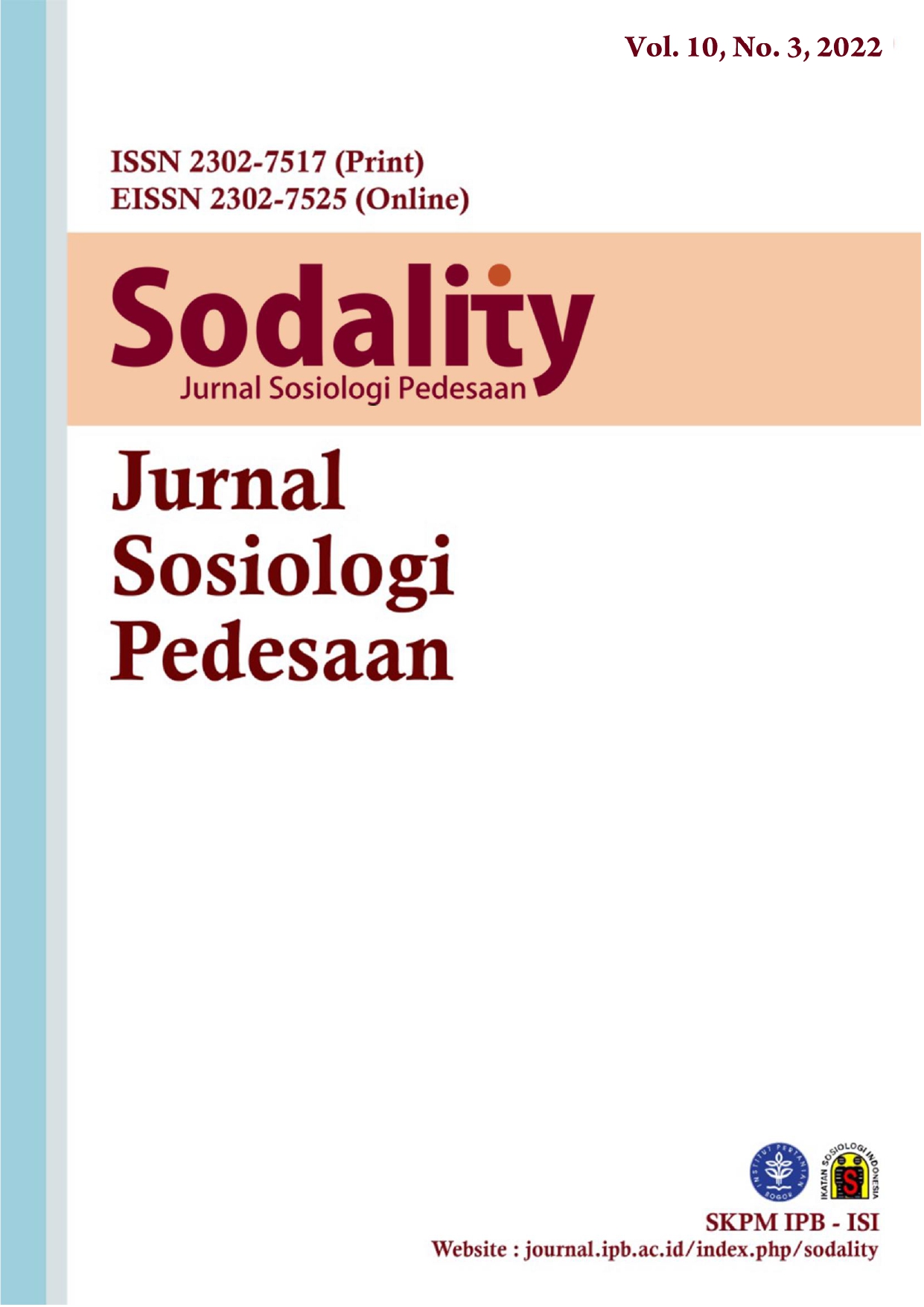The Nurturing Food Sovereignty from the Peripheral Side: the Village Law and the Soul of Agriculture in Rural Development in Indonesia
Abstract
After the enactment of the Village Law, the opportunity for the village as the spearhead of food sovereignty is widely open and the Village Law is considered a soul for village development. Village’s main activities are agriculture, including the management of natural resources with the composition of the area as a place for rural settlements, government services, social services, and economic activities. Most of the population works in the primary sector, which has various challenges to reducing or even eliminating dependence on the global food market. Rural development and the orientation of village agricultural soul so far seem to go hand in hand but tend to be particular. This study aimed to study the primary sector of agriculture and food needs as the main political discourse with the subject of the village. The study was prepared using a qualitative methodology with secondary data and policy analysis. The political economy framework is used to see how far the potential and challenges ahead are toward Indonesia's food sovereignty, amidst the onslaught of neo-liberalism in the global food system. The findings show that Village Law seeks to restore the village's dignity so that it becomes an empowered village faced with the unpreparedness of village capacity.
References
Ariani, M., Suryana, A., Kariyasa, K., & Yofa, R. D. (2014). Mendukung gerakan penerapan pengelolaan tanaman terpadu (GP-PTT) melalui tinjauan kritis SL-PTT.
Beauregard, S., & Gottlieb, R. (2009). Food Policy for People: Incorporating Food Sovereignty Principles Into State Governance: Case studies of Venezuela, Mali, Ecuador, and Bolivia.
Chen, I. J., & Paulraj, A. (2004). Towards a theory of supply chain management: The constructs and measurements. Journal of Operations Management, 22(2), 119–150. https://doi.org/10.1016/j.jom.2003.12.007
Darma, R. (2017). Agribusiness: An Introduction to Agricultural Developement.
Dermoredjo, S. K. (2016). Analisis Kebijakan Pengembangan Padi, Jagung, dan Kedelai di Indonesia dalam Menghadapi Perdagangan Bebas ASEAN. Analisis Kebijakan Pertanian, 12(1), 51. https://doi.org/10.21082/akp.v12n1.2014.51-68
Dwipayana, A., Eko, S., & Sujito, A. (2003). Membangun Good Governance di Desa. IRE, Yogyakarta.
Fauzanafi, M. Z., & Hudayana, B. (2020). Inisiatif Pengembangan BUMDesa sebagai Wirausaha Sosial. Bakti Budaya : Jurnal Pengabdian kepada Masyarakat, 3(1), 60-71.
Friedmann, H. (2016). Commentary: Food regime analysis and agrarian questions: widening the conversation. Journal of Peasant Studies, 43(3), 671–692. https://doi.org/10.1080/03066150.2016.1146254
Hanafie, R. (2010). Pengantar Ekonomi Pertanian. Andi.
Hill, H., Khan, M. E., & Zhuang, J. (2012). Diagnosing the Indonesian economy: Toward inclusive and green growth. Diagnosing the Indonesian Economy: Toward Inclusive and Green Growth, 1–482. https://doi.org/10.7135/UPO9781843313786
Hudayana, B., Sujito, A., Mariana, D., (2019). Arah Demokrasi Ekonomi Desa. IRE, Yogyakarta.
Ilham, N., Saptana, Winarso, B., Supriadi, H., Supadi, & Saputra, Y. H. (2014). Kajian pengembangan sistem pertanian terintegrasi tanaman ternak. In Lap penelitian.
Indraningsih, Sejati, Elizabeth, Ar-Rozy, Suharyono, & Djojopoespito. (2014). Kajian kebijakan dan implementasi diseminasi inovasi pertanian.
Indrawati, D. (2017). Analisis Implementasi Akuntabilitas Penggunaan Dana Desa (Studi Pada Desa Panggungharjo dan Desa Pendowoharjo Kabupaten Bantul). Universitas Gadjah Mada.
Irawan, Rusastra, Hermanto, & Hardono. (2014). Dinamika Sosial Ekonomi Pertanian dan Perdesaan: Analisis Data Patanas.
Marimin, & Maghfiroh, N. (2011). Aplikasi Teknik Pengambilan Keputusan dalam Manajemen Rantai Pasok. Penerbit IPB Press.
Mubyarto. (1990). Pembangunan Pertanian: Koiban dan Bias Pemikiran Anis Lama. Pustaka LP3ES.
Padjung, R. (2018). Improving agricultural commodity supply-chain to promote economic activities in rural area. IOP Conference Series: Earth and Environmental Science, 157(1), 012057. https://doi.org/10.1088/1755-1315/157/1/012057
Rifandini, R. (2018). Transformation of Post-Authoritarian Rural Development in Indonesia: A Study of Farmer-Breeder Community Development in West Bandung Regency. Masyarakat: Jurnal Sosiologi, 23(2). https://doi.org/10.7454/mjs.v23i2.9637
Setiyanto, A., Supriyati, S. H., Susilowati, A., Purwoto, M., Suryadi, Y., & Supriyatna. (2014). Outlook Pertanian 2015–2019.
Shohibuddin, M. (2016). Peluang dan Tantangan Undang-undang Desa dalam Upaya Demokratisasi Tata Kelola Sumber Daya Alam Desa: Perspektif Agraria Kritis. Masyarakat: Jurnal Sosiologi, 21(1). https://doi.org/10.7454/mjs.v21i1.5021
Sjaf, S. (2017). Merebut Masa Depan Pertanian. Kompas, 6. https://kompas.id/baca/opini/2017/12/15/merebut-masa-depan-pertanian/
Sjaf, S. (2018). Pembangunan Pertanian Berkelanjutan dan Socio Culture. Seminar Nasional Pembangunan Pertanian Berkelanjutan Berbasis Sumber Daya Lokal, 1–6. http://www.ejurnal.unisri.ac.id/index.php/innofarm/article/viewFile/28/2
Sujito, A. & Ghofur, M. (2021). Reorientasi Pembangunan Pertanian Indonesia Pasca Covid-19. IRE Press.
Sujito, A. (2004). Desa Pasca Negara Otoriter : Studi Proses Liberalisasi Politik dan Kapitalisasi Desa Era Transisi Otonomi dan Desentralisasi. Fisipol UGM.
Sumaryanto. (2015). Peran Sektor Pertanian Dalam MDGs Dan Kesiapan Menyongsong SDGs. In Reformasi Kebijakan Menuju Transformasi Pembangunan Pertanian. http://www.litbang.pertanian.go.id/buku/reformasi-kebijakan-menuju/BAB-IV-4.pdf
Sunarsih, I., Iqbal, M., Ariani, M., Prasetyo, B., & Azis, M. (2014). Analisis Peran Modal Sosial Dalam Mendukung Pembangunan Pertanian Di Kawasan Perbatasan.
Syahyuti, S. W., Suhaeti, R. N., Zakaria, A. K., & Nurasa, T. (2014). Kajian Peran Organisasi Petani Dalam.
Wahono, F. (2003). Revolusi Hijau: Dari Perangkap Involusi ke Perangkap Globalisasi. In Neoliberalisme. Cindelaras Pustaka Rakyat Cerdas.
Authors who publish with this journal agree to the following terms:
- Authors retain copyright and grant the journal right of first publication with the work simultaneously licensed under a

This work is licensed under a Creative Commons Attribution 4.0 International License. that allows others to share the work with an acknowledgement of the work's authorship and initial publication in this journal. - Authors are able to enter into separate, additional contractual arrangements for the non-exclusive distribution of the journal's published version of the work (e.g., post it to an institutional repository or publish it in a book), with an acknowledgement of its initial publication in this journal.
- Authors are permitted and encouraged to post their work online (e.g., in institutional repositories or on their website) prior to and during the submission process, as it can lead to productive exchanges, as well as earlier and greater citation of published work (See The Effect of Open Access).





.png)









